| Srl | Item |
| 1 |
ID:
101902
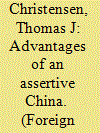

|
|
|
|
|
| Publication |
2011.
|
| Summary/Abstract |
Over the past two years, China's foreign policy has become markedly more belligerent toward both its neighbors and the United States. But Washington should not wish for a weaker Beijing. In fact, on problems from nuclear proliferation to climate change, what the United States needs is a more confident and constructive China as a partner.
|
|
|
|
|
|
|
|
|
|
|
|
|
|
|
|
| 2 |
ID:
014907
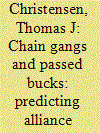

|
|
|
|
|
| Publication |
Spring 1990.
|
| Description |
137-68
|
|
|
|
|
|
|
|
|
|
|
|
|
|
|
|
| 3 |
ID:
022493
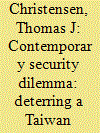

|
|
|
|
|
| Publication |
Autumn 2002.
|
| Description |
7-21
|
|
|
|
|
|
|
|
|
|
|
|
|
|
|
|
| 4 |
ID:
073826
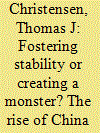

|
|
|
|
|
| Publication |
2006.
|
| Summary/Abstract |
This article explores two starkly contrasting analytic approaches to assessing the performance of U.S. security strategy in East Asia since 1991: a positive-sum approach, emphasizing the danger of security dilemmas and spirals of tension, and a zero-sum approach, emphasizing power competition and the long-term dangers posed by China's rise. In the policy world, the differences between these apparently irreconcilable perspectives are not so clear. Certain policies-for example, maintaining a strong U.S.-Japan alliance-flow from either logic. Moreover, each approach sometimes counsels counterintuitive policy prescriptions that are generally associated with the other. Relatively assertive U.S. security postures apparently have furthered positive-sum regional goals by catalyzing China to adopt reassuring policies toward its neighbors as a hedge against potential U.S. encirclement. From a zero-sum perspective, the United States often competes more effectively for regional influence by cooperating with China than it would by seeking to contain China's economic growth and diplomatic influence.
|
|
|
|
|
|
|
|
|
|
|
|
|
|
|
|
| 5 |
ID:
114958
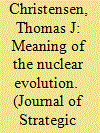

|
|
|
|
|
| Publication |
2012.
|
| Summary/Abstract |
Will China's development of a new generation of nuclear weapons impact US-China security relations in important ways? One's answer depends on how one views the following: whether or not Chinese leaders believe that they are only now acquiring a secure second strike capability; the scope of coercive power that secure second strike capability provides to conventionally inferior actors; the meaning of China's 'No First Use' Doctrine; and the prospects for escalation control in future crises. Applying Cold War theories and tapping Chinese doctrinal writings this article concludes that China's nuclear modernization program might prove more consequential than is commonly believed.
|
|
|
|
|
|
|
|
|
|
|
|
|
|
|
|
| 6 |
ID:
105876
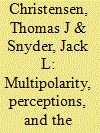

|
|
|
|
|
| Publication |
2011.
|
| Summary/Abstract |
In "Does Chain-Ganging Cause the Outbreak of War," Dominic Tierney critiques our work on alliance politics in Europe in the first half of the twentieth century. Tierney incorrectly ascribes to us a theory about the outbreak of conflict based on a "chain-ganging theory" in which war occurs because states become so tightly tied to their allies that they lose volition and find themselves in conflicts not of their own choosing. In fact, we do not try to explain the origins of war, but instead explain why wars in Europe escalated to a continent-wide scale. Here we briefly restate our argument and demonstrate how Tierney misconstrues it. We also show how some of the factors that we discuss in our original work are useful for assessing Tierney's claim that the causes of conflict and alliance dynamics hinge on whether states are hawks or doves.
|
|
|
|
|
|
|
|
|
|
|
|
|
|
|
|
| 7 |
ID:
107805
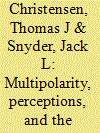

|
|
|
|
|
| Publication |
2011.
|
| Summary/Abstract |
In "Does Chain-Ganging Cause the Outbreak of War," Dominic Tierney critiques our work on alliance politics in Europe in the first half of the twentieth century. Tierney incorrectly ascribes to us a theory about the outbreak of conflict based on a "chain-ganging theory" in which war occurs because states become so tightly tied to their allies that they lose volition and find themselves in conflicts not of their own choosing. In fact, we do not try to explain the origins of war, but instead explain why wars in Europe escalated to a continent-wide scale. Here we briefly restate our argument and demonstrate how Tierney misconstrues it. We also show how some of the factors that we discuss in our original work are useful for assessing Tierney's claim that the causes of conflict and alliance dynamics hinge on whether states are hawks or doves.
|
|
|
|
|
|
|
|
|
|
|
|
|
|
|
|
| 8 |
ID:
140526
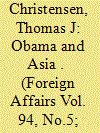

|
|
|
|
|
| Summary/Abstract |
China’s rise poses two broad challenges for U.S. foreign policy: how to deter the People’s Republic from destabilizing East Asia and how to encourage it to contribute to multilateral global governance. Although China is not yet a military peer competitor of the United States, it has become powerful enough to challenge U.S. friends and allies in East Asia and to pose serious problems for U.S. forces operating there. And although China is still a developing country with significant domestic problems, it has become an important enough actor that its cooperation is necessary to solve global problems such as nuclear proliferation, climate change, and international financial instability.
|
|
|
|
|
|
|
|
|
|
|
|
|
|
|
|
| 9 |
ID:
018917
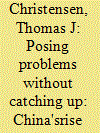

|
|
|
|
|
| Publication |
Spring 2001.
|
| Description |
5-40
|
| Summary/Abstract |
Since the early 1990s, American scholars and strategists have debated whether the People's Republic of China (PRC) will pose a security threat to the United States and its regional interests in East Asia in the next few decades. Although many have focused on intentions as well as capabilities, the most prevalent component of the debate is the assessment of China's overall future military power compared with that of the United States and other East Asian regional powers. So conferences have been held and papers written discussing whether China would become a "peer competitor" or "near peer competitor" of the United States in the military arena, or a "regional hegemon" towering over its cowed neighbors and threatening American interests in a region of increasing importance to the United States.1 [End Page 5]
The debate was hottest in the immediate aftermath of the Cold War era. In the early 1990s, the American economy was suffering and the American military downsizing, while China's economy was growing quickly following the brief post-Tiananmen slump. Moreover, in those years China began increasing its military spending significantly for the first time since 1978. As a result, concerns were expressed about America's ability to maintain its global military presence and supremacy, particularly in East Asia. However, despite a turnaround in the American economy, a slowdown in defense cuts, and the clear persistence of American alliances and internationalism, the question of whether China will become a peer competitor or near peer competitor of the United States in the next few decades still motivates the thinking of many American strategists today. 2
The debate about China as a peer competitor revolves around simple realist notions of how international politics work: Power is what matters; and what matters in power is one's relative capabilities compared with those...
|
|
|
|
|
|
|
|
|
|
|
|
|
|
|
|
| 10 |
ID:
090346
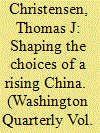

|
|
|
| 11 |
ID:
000924
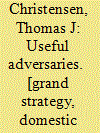

|
|
|
|
|
| Publication |
Princeton, Princeton Univesity Press, 1996.
|
| Description |
xx,319p.
|
| Standard Number |
0691026378
|
|
|
|
|
|
|
|
|
|
|
|
Copies: C:1/I:0,R:0,Q:0
Circulation
| Accession# | Call# | Current Location | Status | Policy | Location |
| 040402 | 327.51073/CHR 040402 | Main | On Shelf | General | |
|
|
|
|